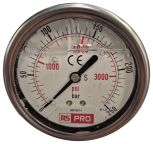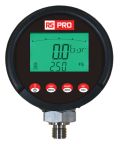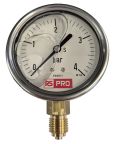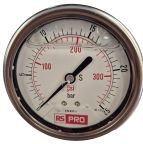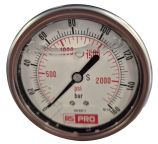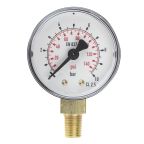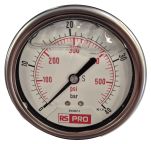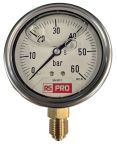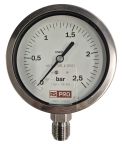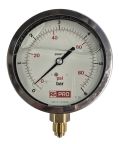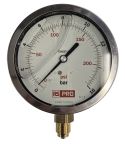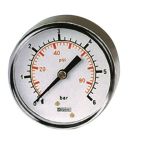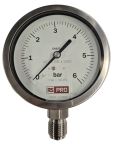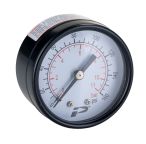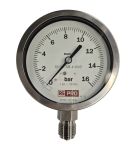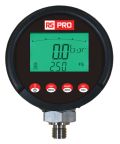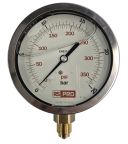- Automation & Control Gear
- Cables & Wires
- Enclosures & Server Racks
- Fuses & Circuit Breakers
- HVAC, Fans & Thermal Management
- Lighting
- Relays & Signal Conditioning
- Switches
- Batteries & Chargers
- Connectors
- Displays & Optoelectronics
- ESD Control, Cleanroom & PCB Prototyping
- Passive Components
- Power Supplies & Transformers
- Raspberry Pi, Arduino, ROCK, STEM Education & Development Tools
- Semiconductors
Pressure Gauges
Pressure gauges are analogue or digital meters used to measure the pressure or vacuum within a fluid power system. These devices can be either analogue or digital and are installed at various points within a machine where pressure monitoring is critical. By monitoring the pressure within a system, these pressure detectors can prevent damage or downtime caused by spikes in pressure, ensuring the safe and efficient operation of equipment.
Analogue Pressure Gauges
Analogue pressure gauges display pressure measurements on a dial. The movement of the needle is controlled by a spring or a tube that changes according to the pressure. It is important to ensure that your dial can read the pressure range within your system, with some models capable of measuring pressures up to 5000 psi or 7500 psi. The pressure scale range is also often measured in "bar", making it versatile for various applications.
Digital Pressure Gauges
Digital pressure gauges utilise microprocessors and sensors to display pressure readings on an integrated digital output display. These gauges are ideal for low pressures due to resolution scales ranging from 0.001 to 0.01 psi. They are available in various diameters and configurations, often designed for bottom entry, making them suitable for both hydraulic and pneumatic systems. Digital gauges are known for their accuracy and ease of reading, making them ideal for calibration tasks.
Need Calibration?
Calibration of your pressure gauge will ensure the instrument is operating correctly and within the manufacturer's specifications. Calibrated gauges will measure within the desired range and provide accurate readings. For more information on this, we offer in-house calibration services in Malaysia if required.
Other things to consider when choosing a pressure gauge include the operating temperature and the accuracy of the reading. Most gauges are mounted on a threaded connection, such as G 1/4, BSP 3/8 or NPT ½.
What Are Pressure Gauges Made From?
Most standard pressure gauges are made from stainless steel or brass, which offer excellent resistance to corrosion and wear. However, there are lightweight alternatives available, such as plastic and aluminium, which are suitable for less demanding applications where weight reduction is a priority.
Where Would I Use One?
Pressure gauges are used in a wide range of industrial applications where it is necessary to check that the pressure is within normal limits. Some of the most common are:
- Air Conditioning Systems: Monitoring refrigerant pressure to optimise performance.
- Heating Systems: Ensuring safe operation by measuring water or steam pressure.
- Compressors: Keeping track of air pressure for efficient operation in various machinery.
- Medical Engineering: Used in devices like ventilators to monitor gas pressures accurately.
- Operating Machinery: Essential for hydraulic systems to prevent overpressure situations.
- Hydraulics Systems: Measuring fluid pressure to maintain system integrity and performance.
How to Choose the Right Pressure Gauge?
Selecting the appropriate pressure gauge for your application is crucial for ensuring safety, efficiency, and accuracy. Here are key factors to consider:
- Accuracy: The accuracy of a pressure gauge is vital for reliable measurements. Look for gauges that meet industry standards, such as ANSI/ASME B40.100-2022. Typically, accuracy is expressed as a percentage of the full-scale reading. For high-precision applications, consider gauges with a lower tolerance.
- Dial Size: Dial size affects readability and is often selected based on the working distance and environmental conditions. Larger dials provide better visibility from a distance, while smaller dials may be suitable for compact spaces. Choose a size that balances readability with installation constraints.
- Case Material: The case material of the pressure gauge must withstand the operating environment. Common materials include stainless steel, brass, and plastic. Stainless steel is ideal for harsh environments and heavy-duty use due to its corrosion resistance, while brass is typically used for indoor applications. Plastic cases are lightweight and suitable for non-harsh environments.
- Media Parts: The internal components that come into contact with the measured media must be compatible with that media. For example, if measuring corrosive fluids, choose materials like stainless steel or specific alloys. Ensure that diaphragms, seals, and other parts are made from materials that won’t degrade over time.
- Connection Size: Connection size is important for fitting the pressure gauge to the piping system. Common sizes include ⅛ inch, ¼ inch, ⅜ inch, ½ inch, ¾ inch, and M 12x1.5. Ensure the gauge's connection size matches your system to prevent leaks and ensure accurate pressure readings.
- Connection Location: The location of the pressure gauge connection affects the measurement and response time. For dynamic measurements, place the gauge closer to the point of measurement. For static readings, positioning farther away can reduce turbulence and provide a more stable reading.
- Pressure Ranges: Selecting the right pressure range is essential. The gauge should be capable of measuring the expected maximum pressure, but it’s best to avoid selecting a gauge that exceeds the required range significantly, as it can affect accuracy. A good rule of thumb is to select a gauge with a full-scale range of approximately 1.5 to 2 times the maximum expected pressure.
Industrial Applications of Pressure Gauges
Pressure gauges are essential tools across various industries, each with unique requirements. Here’s how they are applied in different sectors:
- Oil and Gas: In the oil and gas industry, pressure gauges monitor processes such as drilling, refining, and transportation of hydrocarbons. They measure pressure in pipelines, tanks, and reactors, ensuring safety and operational efficiency. Therefore, gauges must withstand high pressures and corrosive environments, often requiring robust materials and high accuracy.
- Chemical Processing: Chemical plants rely on pressure gauges to control reactions and maintain safety standards. These gauges help monitor pressure in reactors, storage tanks, and distillation columns. Materials must be chemically resistant to the fluids being processed, and accuracy is critical to avoid dangerous overpressure situations.
- Food and Beverage: In the food and beverage industry, pressure gauges monitor processes like pasteurisation and carbonation. They must meet hygiene standards and be made of materials safe for food contact. Accuracy is essential for quality control and compliance with regulatory requirements.
- Pharmaceuticals: Pharmaceutical manufacturing requires precise pressure monitoring to ensure product quality and safety. Pressure gauges are used in processes like filtration, drying, and sterilisation. They must meet strict regulatory standards and be made from materials that are compatible with the sterile environment.
- HVAC: In heating, ventilation, and air conditioning (HVAC) systems, pressure gauges are used to monitor system pressure and ensure efficient operation. They help diagnose issues and maintain optimal performance. Gauges must be reliable and accurate, as they contribute to energy efficiency and system longevity.
Order Pressure Gauges from RS Malaysia
RS provides an extensive selection of high-quality pressure gauges tailored to meet the needs of various industries in Malaysia. Our range includes analogue and digital gauges from reputable brands such as WIKA, Bourdon, Festo and more. Browse our online catalogue today to find pressure gauges with different measurement units, sizes, and configurations, all designed to enhance efficiency and safety in your operations.
For information related to delivery, please visit our delivery page.
Popular Searches
Related links
- Pneumatic & Hydraulic Pressure Gauges
- Manometers
- Pressure Sensors
- RS PRO G 1/4 Digital Pressure Gauge 400bar Bottom Entry
- Pneumatics & Hydraulics
- Parker 1/4 in LCD Digital Pressure Gauge 100bar 90mm Outside Diameter
- SMC R 1/8 Digital Pressure Gauge 1mPa Panel 26mm Outside Diameter
- SMC R 1/8 Digital Pressure Gauge 0.7mPa Panel 30mm Outside Diameter

